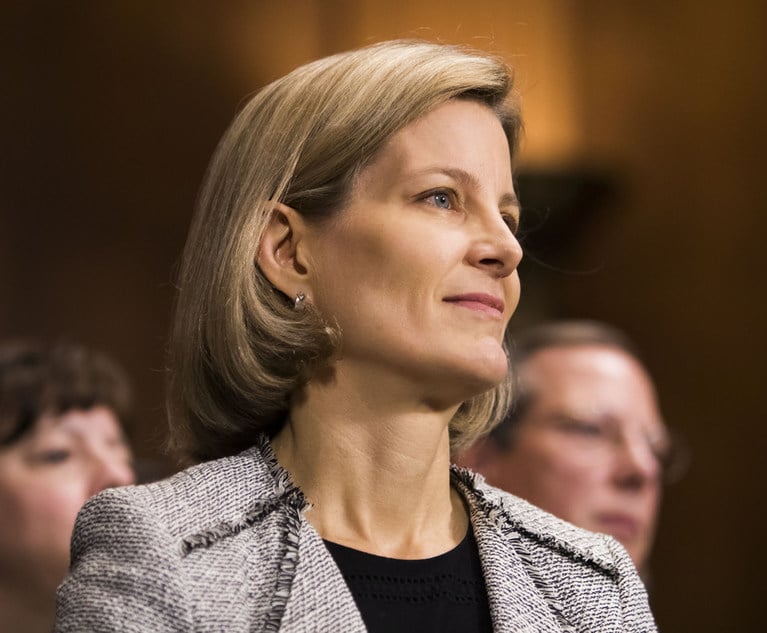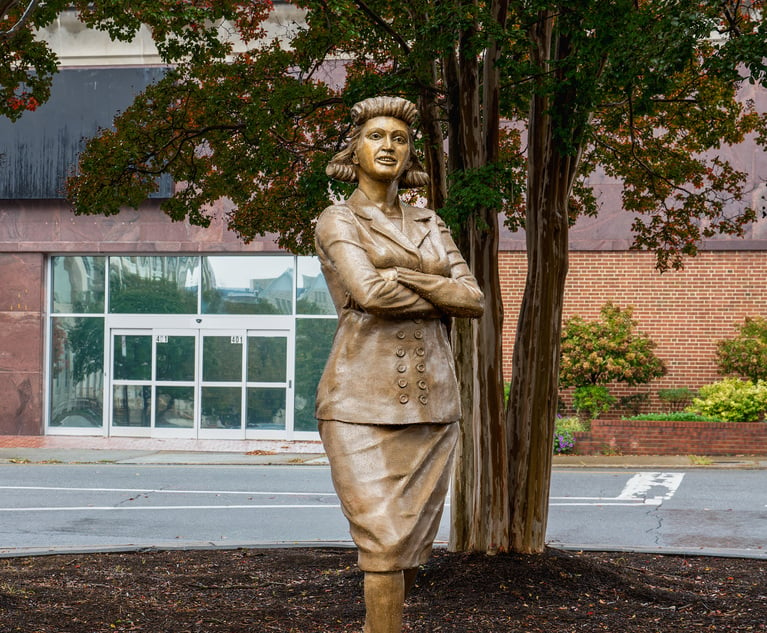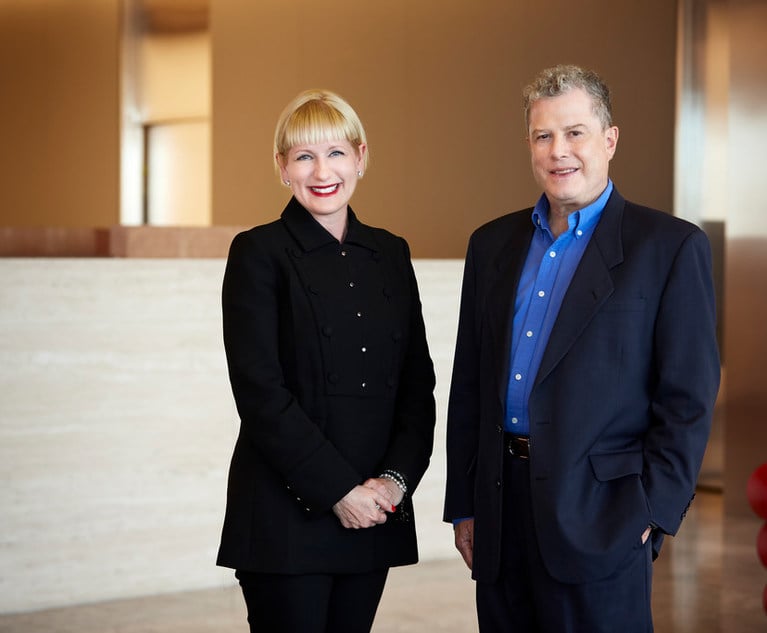Latham Lands Pharma Patent Litigator Adam Perlman From Williams & Connolly
The former co-chair of Williams & Connolly's patent litigation practice has counted Eli Lilly and Bayer among his clients. Latham leaders say his arrival will cement the firm's transition to the brand side of Hatch-Waxman litigation.
January 21, 2020 at 09:00 AM
4 minute read
 Adam Perlman, Latham & Watkins partner
Adam Perlman, Latham & Watkins partnerLatham & Watkins has hired life sciences patent litigator Adam Perlman from Williams & Connolly, a rare lateral move from the venerable D.C. firm to a competitor.
Perlman, 47, has been co-chair of the firm's patent litigation practice for the last five years, representing the likes of Eli Lilly and Co. and Bayer in trials over pharmaceuticals that generate $1 billion or more in annual sales.
Leaders of Latham's intellectual property litigation practice say Perlman brings not only first-chair experience in a booming area of patent law. He'll also help cement the firm's transition to representing branded drugs exclusively in Hatch-Waxman litigation, stemming from the Hatch-Waxman Act that established the framework for generic drug makers to challenge the validity of patents related to the brand-name drug.
"Adam is the guy we're bringing in who's never done generic work," Latham partner Max Grant said. "He wouldn't have come if we weren't committed. It's a statement to the marketplace that we're serious about this."
"I'm flattered they would say that. I hope they're right," Perlman said. "I'm excited about the possibility of enhancing Latham's offerings to those clients."
Latham historically has represented both branded and generic drug makers in disputes over the validity of pharma patents. The mix has trended more toward brands over the last several years as the company took on some high-profile biosimilar cases and "brand-on-brand" litigation.
Latham partner Kenneth Schuler said Perlman remarked on the amount of branded work Latham is doing in their prehire discussions. But that was more of a response to the market than the result of a strategic push, Schuler said. "Now we're in a position to make that conscious choice."
Schuler said that while the lines between brands and generics have been blurring somewhat in recent years, taking a clear position can make a firm more attractive to some clients. Plus, "there's a sense you're building expertise every time you're representing that side," he said. A generic defendant can win by invalidating a patent in any number of ways. "When you're the patentee, you have to run the table," he said.
Perlman said he will continue representing Eli Lilly in its litigation over its anti-cancer drug Alimta, for which he won favorable rulings last year at the U.S. Court of Appeals for the Federal Circuit. He said he could not comment yet on other clients.
He said he considers Williams & Connolly an "excellent firm" and was "not thinking about making a switch at all" when a headhunter proposed he have lunch with Latham partner Grant last March. "I'd been sort of following Latham's practice development from afar and admiring what they've been doing. They've been adding a lot of first-chair patent litigators, a lot of them around my age.
"Over the course of 2019 it went gradually, and we ended up here today," he said.
David Callahan, global chair of the firm's IP litigation practice said in a written statement that Perlman is "known for successfully representing some of the world's leading drug innovators in complex Abbreviated New Drug Application litigation. His experience complements Latham's formidable courtroom reputation and adds further breadth to our life sciences platform."
John Manthei, global co-chair of Latham's life sciences group, said the addition of Perlman "will further fortify our ability to offer full-service, best-in-class representation to our innovative pharmaceutical and biotech clients. We are thrilled to have him on board."
This content has been archived. It is available through our partners, LexisNexis® and Bloomberg Law.
To view this content, please continue to their sites.
Not a Lexis Subscriber?
Subscribe Now
Not a Bloomberg Law Subscriber?
Subscribe Now
NOT FOR REPRINT
© 2025 ALM Global, LLC, All Rights Reserved. Request academic re-use from www.copyright.com. All other uses, submit a request to [email protected]. For more information visit Asset & Logo Licensing.
You Might Like
View All
'Irreparable Harm'?: US Judge Denies Big Pharma Motion to Halt FDA-Approved Generic Drug
3 minute read
'Johns Hopkins Preyed on Black Women': Ben Crump Reps Henrietta Lacks Estate
3 minute read
Several Am Law 100 Firms Help Compliance Startup SingleFile Raise $6.5M

Jenner, Looking at 'Stretch' Goals, Reached Double-Digit Revenue and Profit Growth
5 minute readTrending Stories
- 1States Accuse Trump of Thwarting Court's Funding Restoration Order
- 2Microsoft Becomes Latest Tech Company to Face Claims of Stealing Marketing Commissions From Influencers
- 3Coral Gables Attorney Busted for Stalking Lawyer
- 4Trump's DOJ Delays Releasing Jan. 6 FBI Agents List Under Consent Order
- 5Securities Report Says That 2024 Settlements Passed a Total of $5.2B
Who Got The Work
J. Brugh Lower of Gibbons has entered an appearance for industrial equipment supplier Devco Corporation in a pending trademark infringement lawsuit. The suit, accusing the defendant of selling knock-off Graco products, was filed Dec. 18 in New Jersey District Court by Rivkin Radler on behalf of Graco Inc. and Graco Minnesota. The case, assigned to U.S. District Judge Zahid N. Quraishi, is 3:24-cv-11294, Graco Inc. et al v. Devco Corporation.
Who Got The Work
Rebecca Maller-Stein and Kent A. Yalowitz of Arnold & Porter Kaye Scholer have entered their appearances for Hanaco Venture Capital and its executives, Lior Prosor and David Frankel, in a pending securities lawsuit. The action, filed on Dec. 24 in New York Southern District Court by Zell, Aron & Co. on behalf of Goldeneye Advisors, accuses the defendants of negligently and fraudulently managing the plaintiff's $1 million investment. The case, assigned to U.S. District Judge Vernon S. Broderick, is 1:24-cv-09918, Goldeneye Advisors, LLC v. Hanaco Venture Capital, Ltd. et al.
Who Got The Work
Attorneys from A&O Shearman has stepped in as defense counsel for Toronto-Dominion Bank and other defendants in a pending securities class action. The suit, filed Dec. 11 in New York Southern District Court by Bleichmar Fonti & Auld, accuses the defendants of concealing the bank's 'pervasive' deficiencies in regards to its compliance with the Bank Secrecy Act and the quality of its anti-money laundering controls. The case, assigned to U.S. District Judge Arun Subramanian, is 1:24-cv-09445, Gonzalez v. The Toronto-Dominion Bank et al.
Who Got The Work
Crown Castle International, a Pennsylvania company providing shared communications infrastructure, has turned to Luke D. Wolf of Gordon Rees Scully Mansukhani to fend off a pending breach-of-contract lawsuit. The court action, filed Nov. 25 in Michigan Eastern District Court by Hooper Hathaway PC on behalf of The Town Residences LLC, accuses Crown Castle of failing to transfer approximately $30,000 in utility payments from T-Mobile in breach of a roof-top lease and assignment agreement. The case, assigned to U.S. District Judge Susan K. Declercq, is 2:24-cv-13131, The Town Residences LLC v. T-Mobile US, Inc. et al.
Who Got The Work
Wilfred P. Coronato and Daniel M. Schwartz of McCarter & English have stepped in as defense counsel to Electrolux Home Products Inc. in a pending product liability lawsuit. The court action, filed Nov. 26 in New York Eastern District Court by Poulos Lopiccolo PC and Nagel Rice LLP on behalf of David Stern, alleges that the defendant's refrigerators’ drawers and shelving repeatedly break and fall apart within months after purchase. The case, assigned to U.S. District Judge Joan M. Azrack, is 2:24-cv-08204, Stern v. Electrolux Home Products, Inc.
Featured Firms
Law Offices of Gary Martin Hays & Associates, P.C.
(470) 294-1674
Law Offices of Mark E. Salomone
(857) 444-6468
Smith & Hassler
(713) 739-1250








